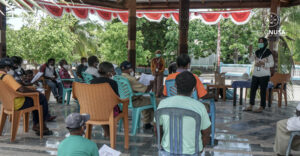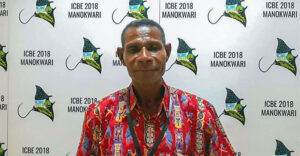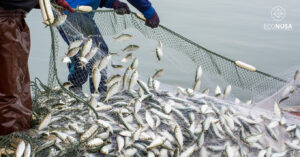
Nineteen young peoples in Maluku Island had call to take in the spirit of traditional institution of nature safeguard. They participated in the School of Eco Diplomacy (SED) of Maluku Young Kewang at Gunung Api Island, Banda District, Central Maluku Regency in Maluku Province on March 11-15, 2021. The event was held by EcoNusa Foundation in cooperation with Moluccas Coastal Care (MCC). They got lessons in the five-day training directly from Haruku traditional kewang, green practitioner, academic and community figures.
Academic of Pattimura University’s School of Law, Renny H. Nendissa, said that kewang is deemed a tradition institution that protects nature from land and ocean. Kewang has duties to provide natural education to the community. Traditionally speaking, kewang is selected from a certain clan. Maluku consists of many islands and thus the call of kewang might be different from other name of different village in Maluku.
“The spirit of kewang as the nature safeguard in sincere manner will be the lesson to study for youngsters of Maluku. Kewang has tough job to safeguard nature on the land and ocean. In addition, kewang is also in synergy with other parties such as community and academic,” said Renny.
As an archipelagic region, Maluku is in jeopardy of global warming effect. The rising sea temperature has whitened coral reefs that makes them dying. The degraded coral reefs affect sea ecosystem noting the fact that around 25 percent of sea biota depends their lives much on coral reefs to survive. In other words, the degraded coral reef will reduce the productivity of fish catch and even decline the appeal to tourism.
EcoNusa Foundation CEO Bustar Maitar gave an example as saying that there are whitened processes of coral reefs in Ai and Hatta Islands. Unfortunately, not all party considers that global warming is an urgent issue. “This is what EcoNusa wants to show to young people in Maluku so that they could understand, comprehend and act to improve nature in Maluku,” said Bustar during the training with EcoNusa’s Ocean Program Manager Wiro Wirandi.
Bustar also underlined that natural destruction is also caused by sea debris due to human deeds. The threat of single use plastic at Maluku sea does not only destroy sea biota ecosystem but also put Maluku people in danger.
“Plastic waste is on the sea bed and coastal areas. When I came here I saw plastic waste. Fish eats plastic. Then we eat the fish. This will affect our health. As young diplomat and young kewang, you play important roles to save the nature of Maluku,” Bustar said.
The participants of SED Maluku Young Kewang came from various places in Maluku, such as Banda Island, Tual City, Aru Islands, Haruku Island, Seram Bagian Barat Regency, Tulehu Village and Ambon City. Every region has their own ecological complexities.
In Seram Island, the use of bomb for blast fishing remains rampant. Topan Farisy Wakanno, a participant from Seram Bagian Barat Regency, regretted the degraded sea ecosystem due to blast fishing using handmade bomb. Besides, coastal abrasion has abraded Seram Island coastline. With his peers, Topan initiated mangrove planting to slow down abrasion.
Meanwhile, as to Erastus Christelgo Manakane, renewing human resources quality in Seram Island is also an urgent need. By improving the community capacity, Erastus expected that the community would have solid stance against any company proposal which plans to acquire their community land under price.
“In some villages, investors have moved in. Luckily, they employ local community. But they buy the community land with low price. Just imagine, it was only 5 million rupiahs for 35 years. In Seram, both natural resources and human resources should be improved,” said Erastus.
Editor: Leo Wahyudi







